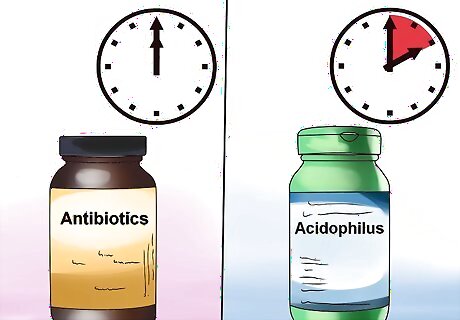
views
Reducing the Side Effects of Antibiotic Use

Consult your physician about what type and how much acidophilus to take. Your doctor will able to best indicate a daily dosage and the form of acidophilus to take. Dosages can range, however for antibiotics-associated diarrhea, 10 – 20 billion CFU per day has been shown to help. Your doctor may suggest you take smaller or larger dosages depending upon the antibiotic taken, length of time you are taking the antibiotic, and your likeliness to get colitis. Some antibiotics, like cephalosporins, fluoroquinolones, and clindamycin, are more likely to cause antibiotic-associated diarrhea. In addition, there are many different dosage forms available such as capsules, tablets, and powders. Use only the form of acidophilus your doctor recommends. Do not mix different types of acidophilus, such as tablets or powders, because each formula contains different strains of bacteria. Use for as long as your doctor recommends. Generally probiotics are used for at least one to three weeks longer than the duration of antibiotic treatment.

Take acidophilus and antibiotics separately. If you take both at the same time, they will not work as effectively. This is because the probiotic is promoting good bacteria, while the antibiotic is depleting your system of good bacteria. Take acidophilus at least one to two hours before or one to two hours after you take your antibiotic. Some recommend two to four hours apart.

Take acidophilus appropriately to increase effectiveness. Make sure the supplement has not expired and has been stored correctly. Expired supplements or supplements that should have been refrigerated but were not may lose effectiveness. Make sure you take it routinely. Sometimes manufacturers or prescribers may suggest taking it with food or taking it right before breakfast as a higher gastric pH may be favorable.

Consider eating foods high in acidophilus. The most common of these foods is yogurt. Many commercial brands of yogurt contain probiotics, such as acidophilus. There are even brands that advertise the probiotics that they contain. Eating yogurt daily will add acidophilus to your diet, but a lower amount than if you take a supplement.
Learning About Acidophilus and its Use with Antibiotics

Learn about acidophilus. What is acidophilus? Acidophilus (Lactobacillus acidophilus or L. acidophilus) is a type of “good bacteria” in your body. The good bacteria helps to break down food in your colon and protect against “bad bacteria” by producing lactic acid. Acidophilus is naturally found in your body and may be taken as a probiotic supplement to help with various GI issues and other conditions. In addition to acidophilus, there are many other probiotics available, some in the Lactobacillus species. However, Lactobacillus acidophilus is the most commonly used probiotic.

Know what acidophilus is used for and how it works with antibiotics. Clinical studies have found that acidophilus suppresses the growth of pathogens (something that can cause disease, such as bad bacteria) in the digestive tract. It can be used to manage gastrointestinal conditions (such as irritable bowel syndrome), aid digestion, reduce vaginal yeast infections, help with other conditions such as lung infections or skin issues, and reduce antibiotic-induced diarrhea. In the case of antibiotic-induced diarrhea, when you take antibiotics to rid your body of the bad bacteria that is causing infection, you can lose some of the beneficial bacteria that are in your gut. A decrease in healthy bacteria can lead to the overgrowth of “bad” bacteria that can produce toxins, and cause inflammation and diarrhea.

Understand why preventing antibiotic-induced diarrhea important. Most of the time, antibiotic-associated diarrhea is mild and goes away after you stop the antibiotic. However, sometimes it can lead to serious issues like colitis (inflammation of your colon) or a serious type of colitis called pseudomembranous colitis. About one third of the time, long term (usually hospital) antibiotic use can lead to a Clostridium difficile infection, which is a serious infection that is hard to cure and causes frequent diarrhea. Recent important studies have shown that probiotics like acidophilus can prevent or reduce antibiotic-associated diarrhea and may also be helpful in preventing C difficile infection. C. diff occurs most commonly after the use of fluoroquinolones, cephalosporins, clindamycin, and penicillins.




















Comments
0 comment